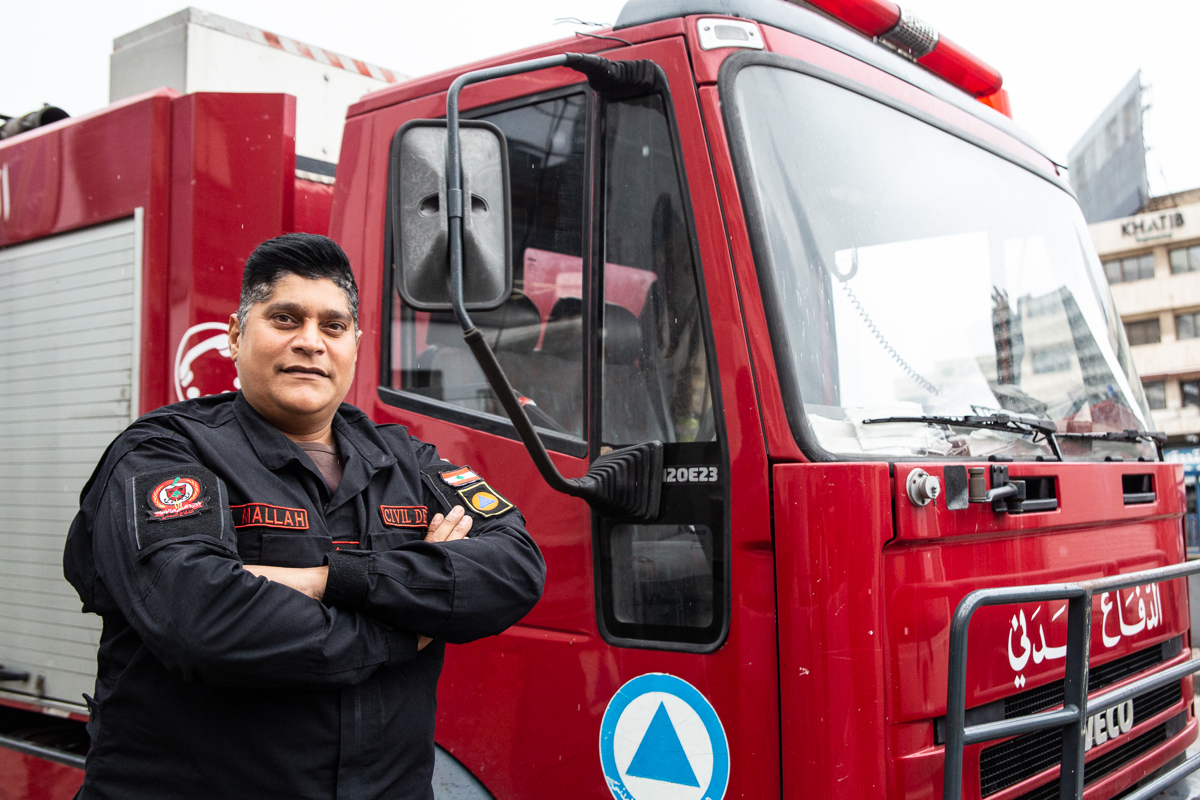From where I Stand: “Women make up half of our society, having their voices heard in disaster response planning is vital.”
Date:
Youssef Rafiq Mallah, 48, attained his life-long dream to become, like his real-life hero, a member of the Civil Defense. As the Head of the Beirut Regional Center Civil Defense Operations Unit, he oversaw the August 2020 Civil Defense Beirut Port Explosion operations, where women and civil society played a vital role in saving lives.
Having witnessed this, Youssef now works to integrate gender issues into the disaster management work and planning of his Civil Defense team of eight women and four men. This is done in cooperation with a project led by Lebanese civil society organization Auberge Beity, ‘Participation in Disaster Management Accountability’, funded by the United Nations Women’s Peace and Humanitarian Fund (WPHF) and the Government of Germany, with technical support provided by UN Women Lebanon.

![]()
Like other kids growing up I idolized superheroes. Superman and Grendizer were my favourite. I would dream of flying like them. One day, back in 1989, I saw a funeral procession passing my house. It was for a man called Muhammad Rostom, a Civil Defense volunteer, who lost his life while rescuing victims of a bombing in the Jama’a Al Arabia area (in Beirut). I took his picture and hung it alongside those of Superman and Grendizer, and a real-life hero became my hero. Soon I would start taking down pictures of the fictional superheroes, leaving only Muhammad. Ever since that time, I have wanted to volunteer in the Civil Defense.
At first, I was not accepted into the Civil Defense because I was young and short. But I was so determined that I convinced my cousin to turn his car into an ambulance. With our poorly painted ambulance car, and a flashing beacon on top - paid for by my sister – for two years we would whizz around to help our community and rush to the scene of a fire, to support the Civil Defense. This of course caught the attention of the Civil Defense, who agreed to let me join. Despite my interest in humanitarian work, it was with the Civil Defense that I learned to cherish my community and those in it.
When I joined the Civil Defense, colleagues used to think that it was shameful for women to join and work alongside them. I have always disagreed with this sentiment; I am proud to work beside some of the most incredible women I have met throughout the years, and every day I am astounded by their strength. Women now make up a third of the force in Lebanon; 94 women out of 282 volunteers to be exact.
I lead the Beirut Regional Center Civil Defense Operations Unit, but our work extends to the entire country. Wherever duty calls us, we go.
In August 2020 I suddenly felt as if the entire earth shuddered. Our unit was immediately deployed to the port. The scenes we came across were the most horrific I have ever seen. Despite this, the members of all communities across Beirut and the country immediately began coming together to assist in any way they could. This caught me off guard. All around us, women, men, girls and boys of all nationalities and religions were supporting, transporting the wounded on motorcycles, sweeping and clearing the way for us and providing food and water. The kindness was without limits, everyone showed almost unattainable standards of humanity.
I saw a woman in her seventies beckoning us to where someone was stuck inside a collapsed building, in Achrafieh. As we drew closer, all of a sudden, she lifted a stone to help us get to the victim, a stone so heavy it took two of us to lift later on. Only 30 seconds of delay can change the possibility of saving someone’s life; this woman contributed to rescuing this victim. She is a hero in her own right. If I could find her today, I would give her a medal.
It was during this time that I realised the strength and power of civilians, communities, organizations, and security forces coming together to overcome hardship. It showed what can be done if we unite. It was for this reason that I joined the Auberge Beity project supported by UN Women which aims to facilitate linkages between our units and civil society actors and organisations. The project aims to bring women’s voices into the work we do in managing disasters. Women played such a vital role in the response to the Beirut Explosion, that I realised we need them to make our disaster response planning more effective.
Women’s low representation across all areas of life is a major flaw. Women make up half of our society and their voices are vital. This project serves as a key steppingstone to further educate the Civil Defense teams and others on how to be more inclusive and how to integrate women’s priorities and needs in all of our planning to help us to work together for the betterment of our community and country.”
Youssef Rafiq Mallah’s story exemplifies the efforts being led under the ‘Participation in Disaster Management Accountability’ Project which is facilitating training for the Civil Defense, Internal Security/Police Forces and six Civil Society Organizations to foster collaboration in gender-responsive disaster management planning.